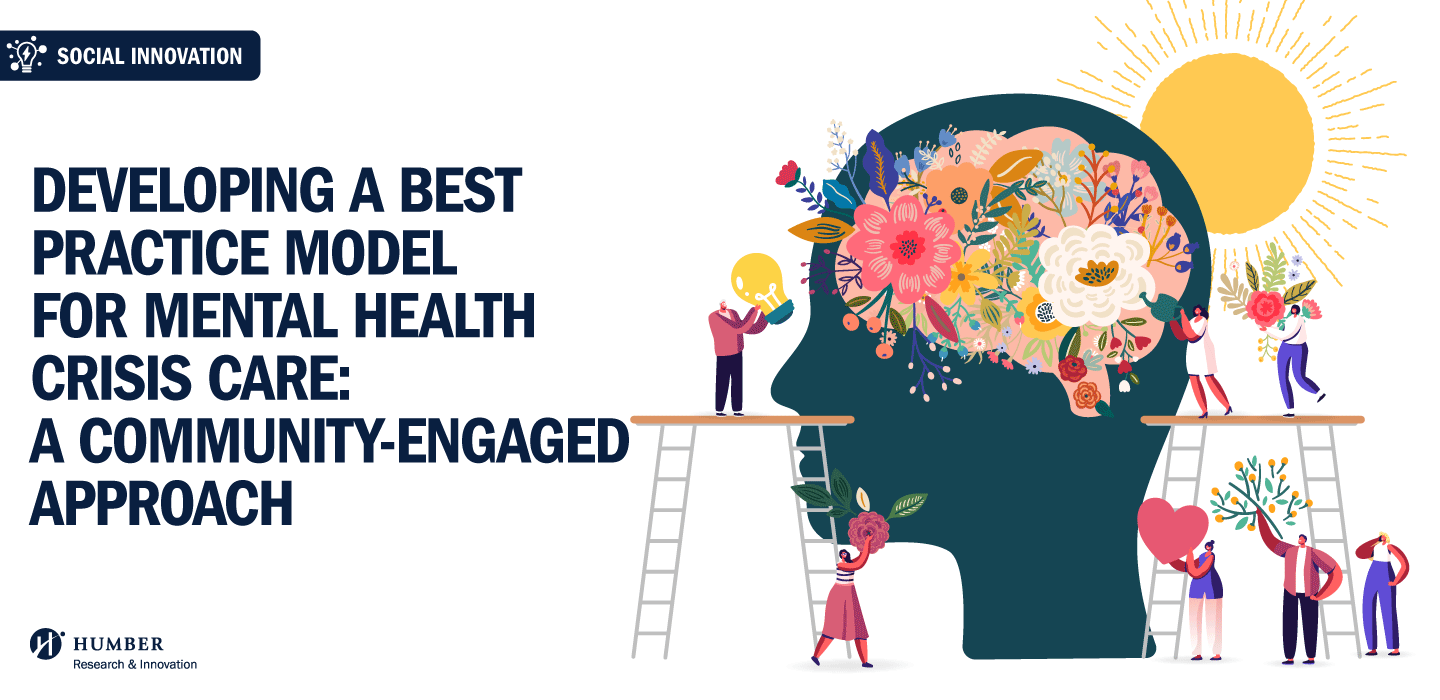As the world grapples with two years of a global pandemic, Humber College faculty members, researchers and students are conducting various research projects to mitigate the impact of COVID-19 on our communities. As the pandemic unraveled many aspects of everyday life, it brought to the forefront the urgency of many issues. In particular, the importance of mental health and well-being came into sharpened focus as the healthcare system strained to meet the increasing demands of its services.
A highlight of Humber’s research project addressing mental health and well-being is Developing a Best Practice Model for Mental Health Crisis Care: A Community-Engaged Approach. Led by faculty members in the Faculty of Health Sciences & Wellness and Faculty of Social & Community Services at Humber, the research team is collaborating with TAIBU Community Health Centre and Middlesex-London Paramedic Service to develop a best practice model for response to mental health crisis care.
The focus of this project is to explore the ways in which models of community-based organizations and acute care institutions (e.g., paramedics, police, and emergency department services) can collaboratively inform the most promising practices for emergency mental health response. The project aims to develop practices to support community members in need of emergency mental health assistance, especially people of lower socioeconomic status, Black and Indigenous communities, racialized people, LGBT2SQ+ and immigrant communities. Of particular interest for this project are non-medicalized, non-traditional approaches to mental health support, including peer support and approaches that account for social determinants of health.
The research project received the Natural Sciences and Engineering Research Council of Canada (NSERC) College and Community Social Innovation Fund (CCSIF) grant ($360k) in 2021. The CCSIF grants support college social innovation research projects in partnership with local community organizations.
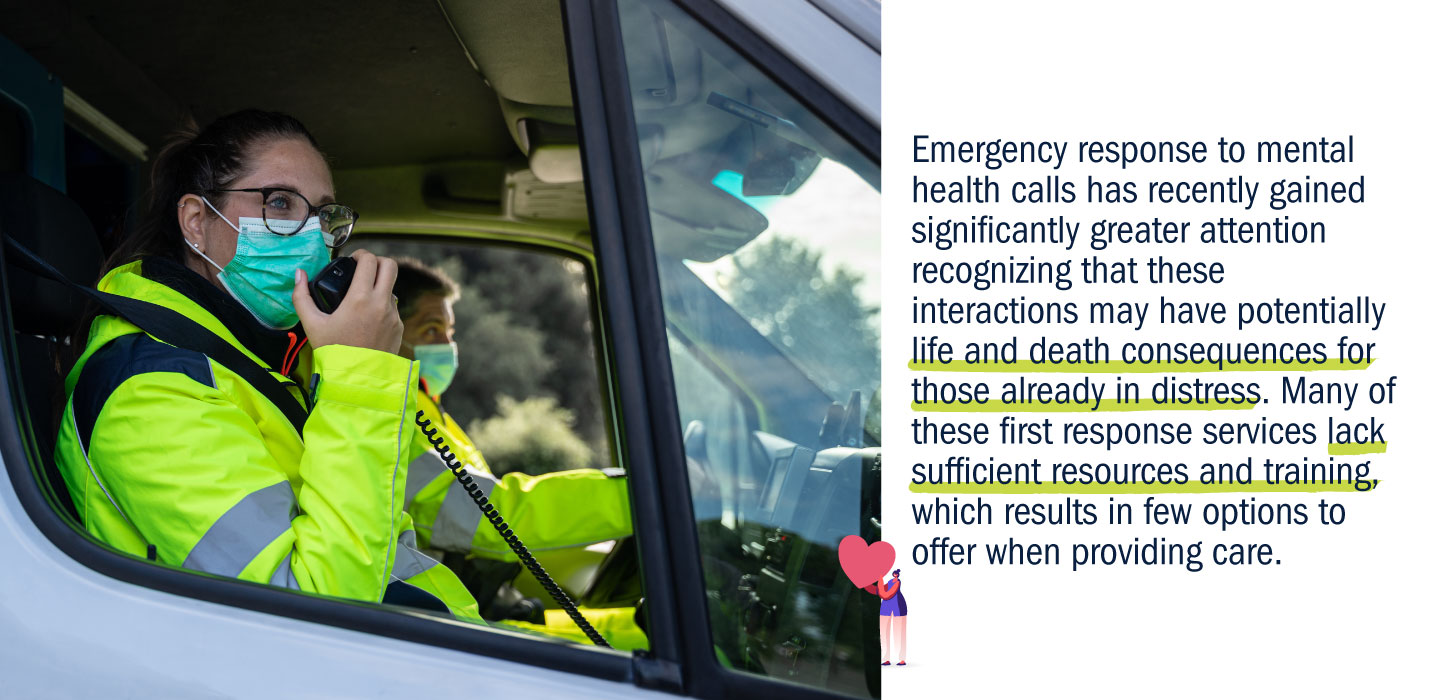
Challenge
When experiencing a mental health crisis, many people rely on emergency services such as 9-1-1 dispatchers, paramedic services, police services and hospital emergency department services.
Emergency response to mental health calls has recently gained significantly greater attention recognizing that these interactions may have potentially life and death consequences for those already in distress. Many of these first response services lack sufficient resources and training, which results in few options to offer when providing care.
This research project plans to highlight and develop practices that appropriately support all members of the community requiring emergency mental health support. In addition to a best practice model, the project aims to co-develop workshops and training for practitioners working in these fields.
The research questions are two-fold:
- Informed by acute care and community-based institutions, what practices and models of care can provide appropriate, high-quality support for individuals in distress in need of emergency mental health support? In particular, what non-medicalized supports may improve comprehensive care in this area?
- What training, resources and skills may be developed to best support practitioners providing care and support for emergency mental health needs?
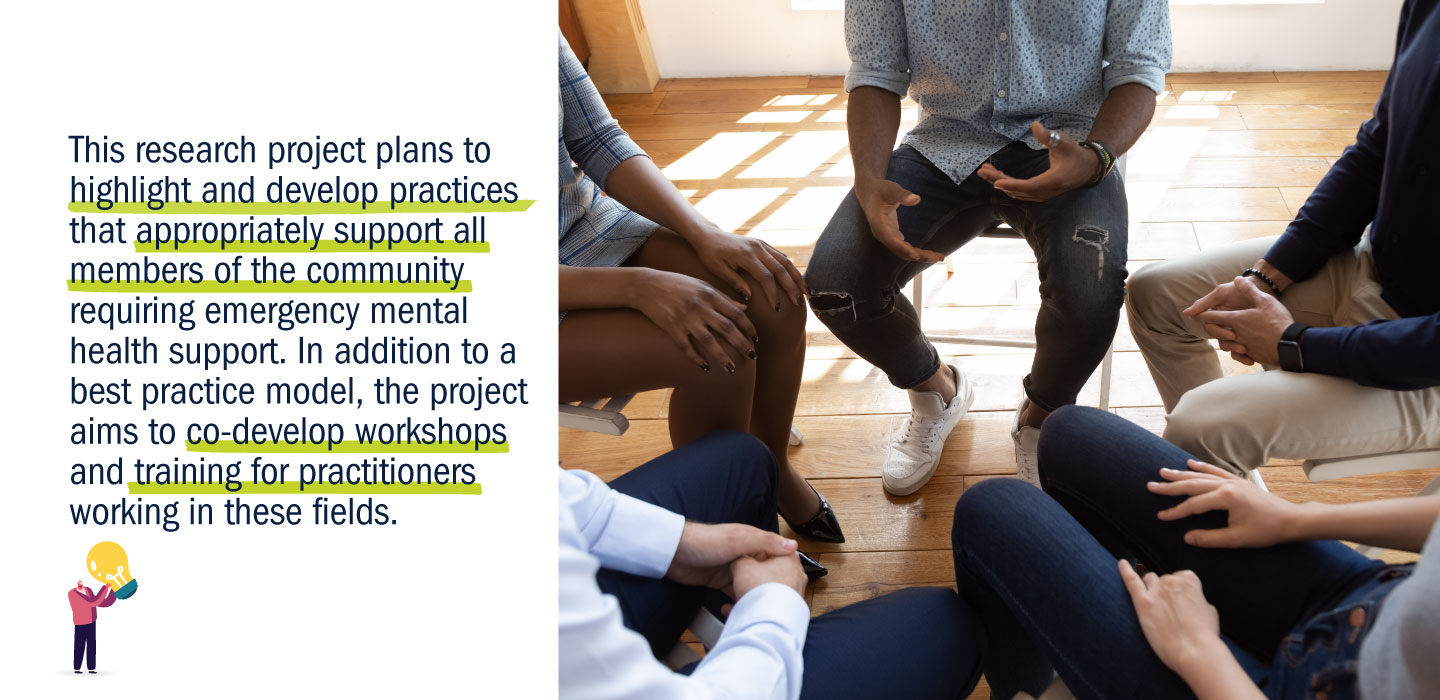
Project leads
Polly Ford-Jones, AEMCA, MA, PhD, is a Professor in Allied Health in the Faculty of Health Sciences & Wellness at Humber College. She is a practicing Primary Care Paramedic in southern Ontario and a qualitative researcher. Her research focuses on issues of health equity, the social determinants of health, and emergency prehospital mental health and psychosocial care.
Reflecting on what makes the research project special for her, Polly says:
“What’s great about this research project is that it is a combination of the practical and the academic. I really enjoy the university-based academic and theoretical focus. But having the practical focus that comes from so many college-based faculty members who have ongoing frontline work and just taking the passion that's coming from that frontline work and bringing it together with the academic makes it a truly collaborative project that combines many different perspectives.” —Polly Ford-Jones
Sheryl Thompson, H.BSW, MSW, RSW, is a Professor and Program Coordinator in the Emergency Telecommunications Program in the Faculty of Health Sciences & Wellness at Humber College. Sheryl has a passion for infusing decolonizing practices along with equity, diversity and inclusion into curriculum and teaching. Sheryl is a Registered Social Worker and is the founder and clinical practice leader of a private practice providing services to individuals, groups, families, and communities. Sheryl has taught across programs at Humber, including Social Service Worker, Massage Therapy, Fire Services, and Emergency Telecommunications, a program in which she is also an alumnus.
When asked about what the research project means to her, Sheryl responds:
“For me, this almost felt like it is an opportunity for me to leave a legacy in my profession as a social worker and as a faculty member. This research really touches my heart because this is the interconnectedness of everything that I've been doing on the frontlines. Research is a way to open up doors for others, continue the dialogue, challenge some of the ideologies and paradigms that are out here, and give voice to a community.” —Sheryl Thompson
Danielle Pomeroy, BSW, MSW, RSW, is a Professor in the Police Foundations Program in the Faculty of Social & Community Services at Humber College. She is a Registered Social worker who has spent the past 22 years working within the criminal justice and mental health sectors. Danielle has extensive experience and training in children’s mental health, youth justice, crisis intervention, trauma, restorative justice, mindfulness, and family relationships. In addition to teaching, Danielle has a small private clinical practice.
On why she’s passionate about the research project, Danielle states:
“I have spent most of my career on the front line and working alongside first responders and community agencies to support those experiencing a mental health crisis. As a social worker, nothing is more challenging than not having access to the right intervention at the right time for those in crisis. I am so proud to be a part of this very important research to develop a best practice model based on the lived experiences, practices and research within the community.” —Danielle Pomeroy
The Humber research team is collaborating with Dr. Simon Adam, an Assistant Professor in the School of Nursing, Faculty of Health at York University, and Dr. Patrina Duhaney, an Assistant Professor in the Faculty of Social Work at the University of Calgary. Along with the partner organizations, this multi-disciplinary team of researchers brings extensive academic and frontline experience from across care sectors.
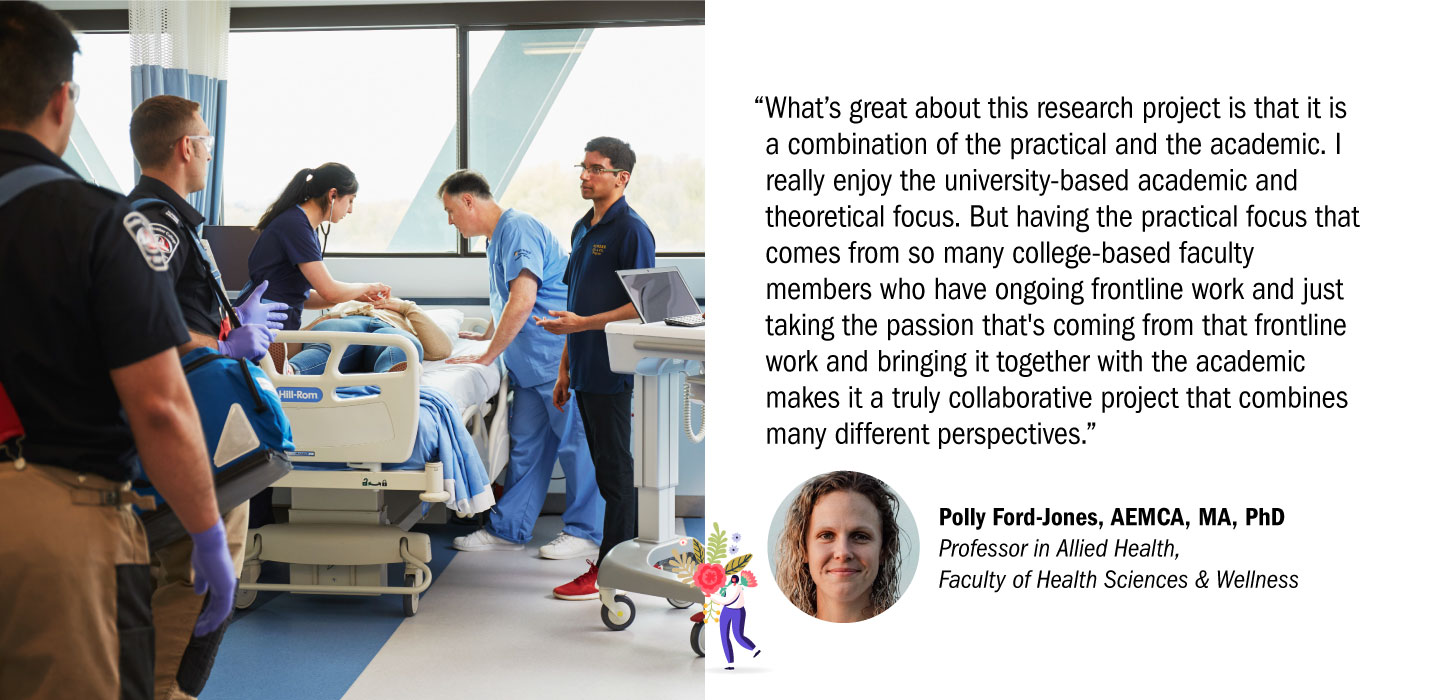
Community partners
The research team is collaborating with TAIBU Community Health Centre (CHC) and Middlesex-London Paramedic Service to develop a best practice model for response to mental health crisis care. TAIBU CHC is a multi-disciplinary, non-profit, community-led organization that delivers health and social services to its surrounding neighbourhood in Toronto. TAIBU CHC has identified the significant gap in appropriate emergency mental health response for the disenfranchised communities they serve and the life and death consequences that current, inadequate services may have. Through the partnership, TAIBU CHC brings a wealth of experience in meeting the needs of local communities and identifying gaps in existing mental health supports.
Reflecting on the partnership with TAIBU CHC, Sheryl shares:
“TAIBU works with marginalized communities, specifically people of colour and other community members who are most ostracized. TAIBU has many different support services for these people. Based on our research modality, it was an organization we definitely wanted to partner with because they represent several different voices of the community, which is really important when it comes to the dissemination of the research piece.” — Sheryl Thompson
Middlesex-London Paramedic Services (MLPS) is a regional paramedic service serving rural and urban populations in southwestern Ontario that provides 9-1-1 emergency medical response as well as ongoing community paramedicine to meet the needs of their communities. MLPS is a leader in mental health response and has established programs within their paramedic service to address the mental health calls they receive and create multiple options for emergency mental health care through an alternate destination program (optional transport to a crisis centre rather than emergency department), on-scene crisis response teams and interdisciplinary crisis response teams.
Asked about why the research team decided to partner with MLPS, Polly states:
“Middlesex-London Paramedic Services (MLPS) has a formally approved program in Ontario, through which they take people needing mental health support to an alternate destination, as opposed to just the emergency department. They've been doing really creative and forward-thinking work in this field. As part of this research project, we wanted to work with organizations like MLPS, learn from their experiences and incorporate many different voices.” — Polly Ford-Jones
Research phases
The project is composed of three phases, of which phases one and two will occur simultaneously.
Phase 1: Community-based dimension
- Conduct interviews, focus groups, and surveys with participants from community-based institutions
Phase 2: Acute care institution dimension
- Conduct interviews, focus groups, and surveys with participants from acute care institutions, e.g., paramedic, police, emergency department services
- Conduct observation in an emergency department setting, examining the ways in which those with mental health needs are processed through the emergency department
Phase 3: Customizing models of care to meet emergency mental health care needs in the community. This phase brings together findings from the first two phases and engages both community-based and acute care institutions in a collaborative discussion to inform enhanced emergency mental health response. The aim of phase three is to co-develop customized models of care based on the findings and input of partner organizations to inform promising practices in emergency mental health response. Based on the findings from phase one and phase two, the research team in phase three will aim to develop policy recommendations, workshops and training content for relevant professions both pre-entry to practice and for working professionals.
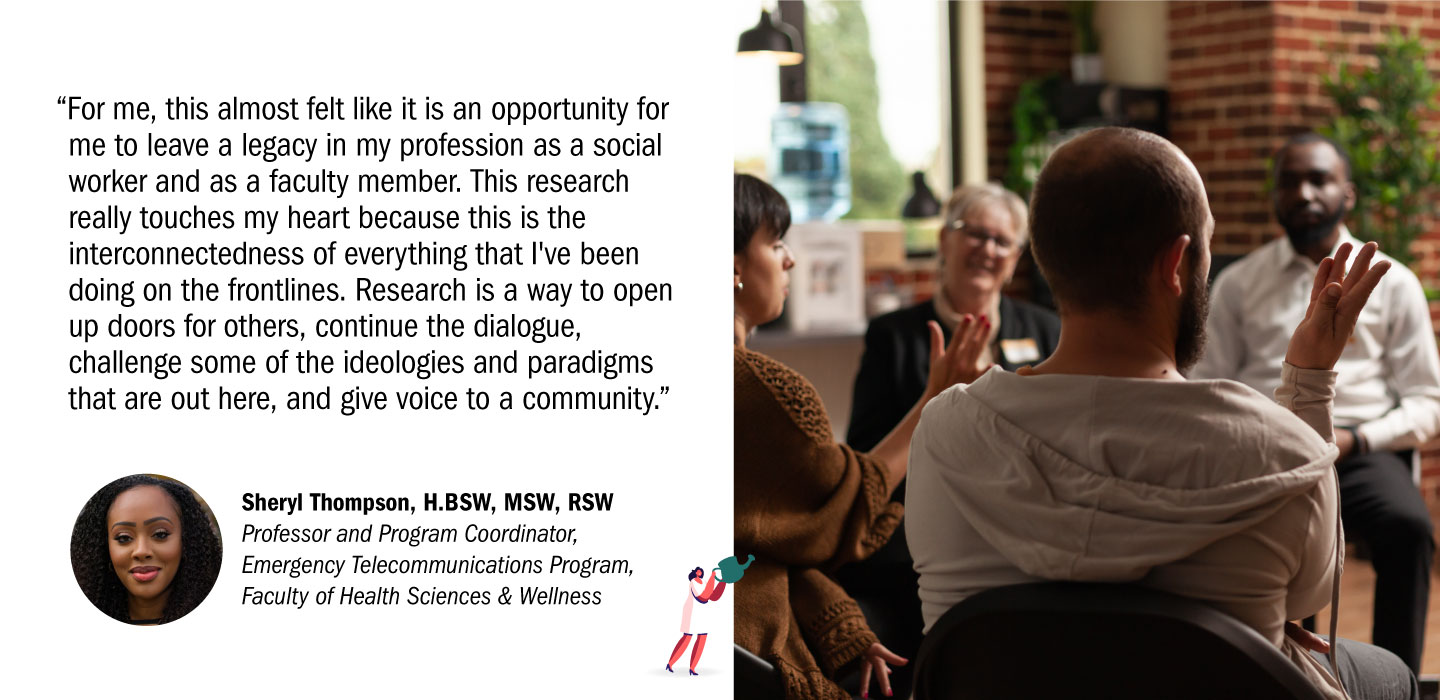
Research methodology
The project will be conducted using a primarily qualitative ethnographic case study of emergency mental health response in Ontario through community-based and acute care institutions. The research team will conduct interviews, focus groups, observations, and surveys with care providers across sectors and care recipients in both community-based and acute care settings. Interview, focus group, survey data, and field notes from observations will be coded thematically. The main theories guiding the research include feminist political economy analysis, critical disability theory, critical race theory, anti-oppressive theory, and other critical social work lenses.
Student Involvement
The contribution of the student research assistants makes up an integral component of the research project. The students will receive supportive mentorship through training in conducting literature reviews, data collection, analysis and developing outputs for knowledge mobilization and involvement in team meetings and project planning. While developing research skills in the field and working in a collaborative, interdisciplinary environment, the students will gain meaningful experience and learn from experts across various disciplines. The research assistants currently participating in the project are Petra Meijer and Annemarie Antunes. The students’ experience in the project will also help build research capacity in the gradually expanding field of paramedic researchers.
On the role of research in students’ educational experience, Danielle states:
“Research ignites the opportunity to really weave the frontline experience by getting involved in the research that guides the practice. In the classroom, it cultivates conversations and interests with our students and illuminates for our students that learning never ends. It is a great opportunity to work alongside a research team and student research assistants.” —Danielle Pomeroy
Potential for impact
The anticipated impact of the research project is an improvement to emergency mental health responses, including co-developed customized models of care based on research findings and input across sectors and the development of policy recommendations, both for community and acute care sectors. In addition to improved models of care, resulting workshops and training for professionals working in emergency response fields have the potential to improve the quality of care provision and build capacity in the ongoing development of this field. It’s anticipated that pilot models of care developed from the project will lead to continued study and adaptation, which has the potential to have a provincial impact and potentially national relevance for model development.
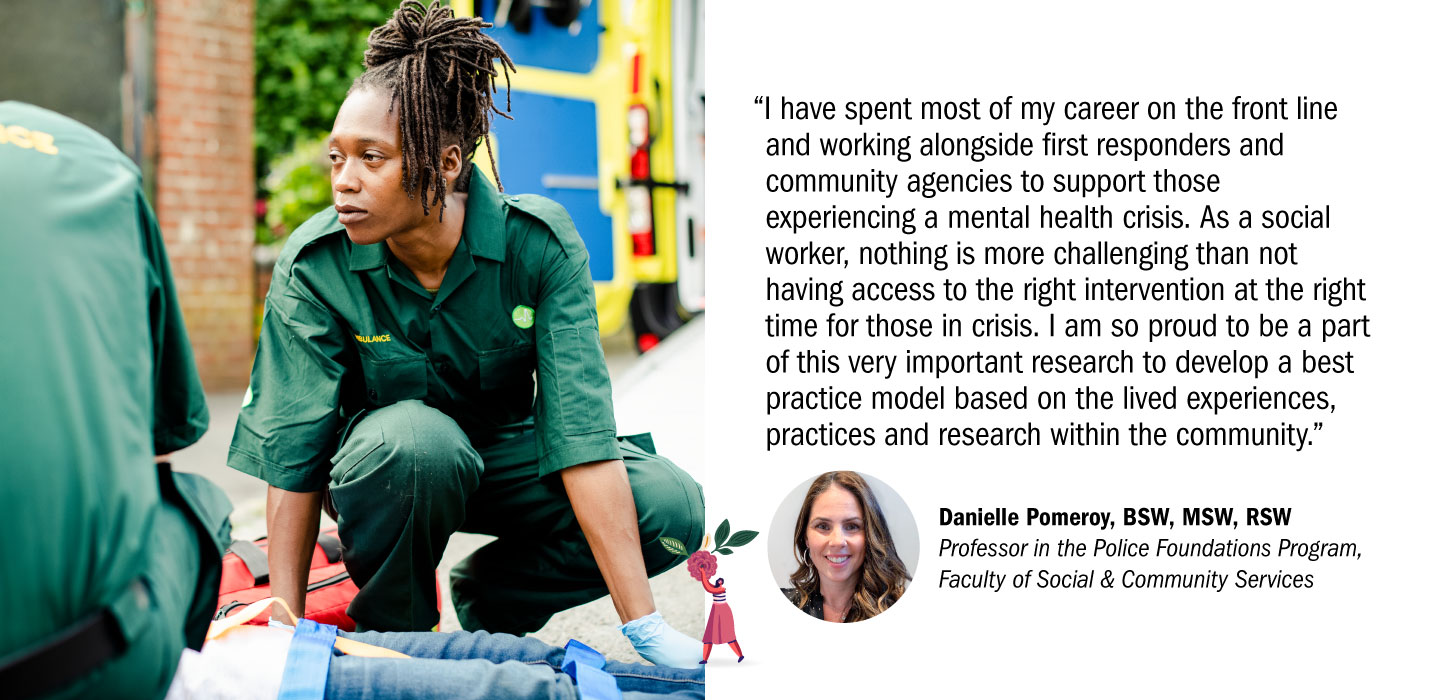
On Research
Asked to define what research is in their own words, the Humber research team leads had the following to share with us:
“Research is an opportunity to further explore territory that needs more attention and develop some answers and possibilities that can move an issue forward.”—Polly Ford-Jones
“Research is an opportunity to take my experience and education to leave a legacy for the profession.” —Sheryl Thompson
“Research is an ongoing learning process and an opportunity to make a difference in our field.” —Danielle Pomeroy
Get to know Polly a little better. Here are five things you did not know about her:
- Favourite book: “Stories about people’s lives are my preferred.”
- Favourite social media platform: Twitter
- Hidden talent: Martial Arts
- Favourite researcher/ innovator or research project: “The Psychiatrization of Poverty: Rethinking the Mental Health-Poverty Nexus” by China Mills
- Coffee or tea: Tea
Get to know Sheryl a little better. Here are five things you did not know about her:
- Favourite movie: The Color Purple
- Favourite social media platform: TikTok
- Hidden talent: Interior Design
- Favourite researcher/ innovator or research project: “The Stanford study conducted on children’s delay of gratification using marshmallows”
- Coffee or tea: Tea
Get to know Danielle a little better. Here are five things you did not know about her:
- Favourite book: The Alchemist by Paulo Coelho
- Favourite social media platform: Instagram
- Hidden talent: Flying Trapeze
- Favourite researcher/ innovator or research project: Gabor Mate for his work on Addiction and Trauma and Kevin Cameron (North American Centre for Threat Assessment & Trauma Response)
- Coffee or Tea: Oat Latte
Learn more about ways to get involved in research projects taking place at Humber.

We acknowledge the support of the Natural Sciences and Engineering Research Council of Canada (NSERC). Nous remercions le Conseil de recherches en sciences naturelles et en génie du Canada (CRSNG) de son soutien.
